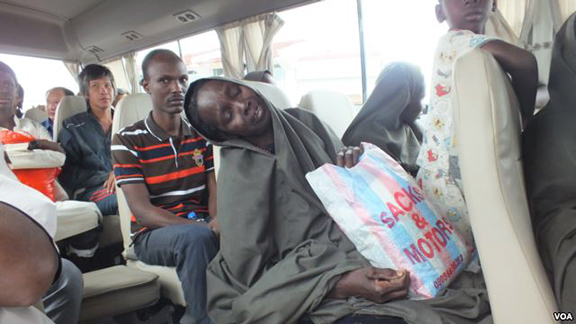Informed and Conscious
Warnings of disturbing content precede Hulu’s “The Handmaid’s Tale,” an adaptation of Margaret Atwood’s 1985 novel. Hulu’s series stars Elizabeth Moss as “Offred.” Offred, meaning of-Fred, has been assigned to be a procreative surrogate for Commander Fred Waterford and his wife. Spoiler Alert: in “Gilead,” a revolutionary theocracy located geographically between Canada and Mexico, selected fertile women are stripped of their own families and identities and assigned to procreative duties in “good” homes of theocracy leaders under the threat that they’ll fare far worse if they don’t cooperate and produce. Gilead’s newly subjugated men and women go along to get along and to avoid being shipped to Gilead’s “colonies.”
“The Handmaid’s Tale” should disturb viewers. It is based on fact.

Hulu’s “The Handmaid’s Tale,” an adaptation of Margaret Atwood’s 1985 novel. Hulu’s series stars Elizabeth Moss as “Offred.”
Atwood told the NY Times that she put nothing in “The Handmaid’s Tale,” that had not occurred already in what Atwood, quoting James Joyce, describes as, “the nightmare of history.” This seems true. Governments and religions have alternately forced and suppressed childbearing to suit the socioeconomic demands of the times. In the 1927 decision “Buck v. Bell,” the Supreme Court denied a young Virginia woman the choice not to be surgically sterilized. Pre-WWII era American eugenicists promoted immigration quotas targeting non-WASP European nations, while at home, sought to stop a target 10% of America’s home grown “undesirables” from reproducing. The non-fiction “Imbeciles,” by Adam Cohen, and “White Trash – The 400 Year Untold History of Class in America,” by Nancy Isenberg describe the marginalization poor Americans some of whom were descendants of the first so-called “waste people,” England shipped to America’s first colonies.
Circumstance and labeling manufacture undesirables out of flesh and blood individuals.
Recently, many Nigerian Christian girls held and taken as “wives” by radical Islamic Boko Haram kidnappers returned home. (Loosely translated, Boko Haram means “no fake/western education.”) Some girls, returning with children they conceived during their captivity, found themselves shunned by their own families. Other girls stayed with their Boko Haram husbands perhaps having converted to Islam, perhaps due to Stockholm Syndrome or, perhaps because they knew how they’d be treated back home. These girls are now the “them” in us versus them.

After months of captivity by suspected Boko Haram militants, ex-hostages arrive at Cameroon’s Yaounde Nsimalen International Airport.
In many places and times, females have always been “them.”
In primitive societies, adults initiated girls and boys into the tribe differently, separating them at puberty. Boys joined men in the hunt. Girls were sexually shamed, sometimes through clitorectomy, a mutilation still committed in Africa and sometimes Islam, to eliminate female sexual desire and prove virtue.
Anthropology and modern pop psychology suggest that men generally form alliances through activities while girls bond through communication. While these stereotypes and tendencies are changing, young men and women are tested and test each other in brutal, primitive ways.
In an interview with CBS, parents of Penn State fraternity hazing victim Tim Piazza characterized their son’s death as murder. Jim Piazza told CBS, “This wasn’t boys being boys. This was murder of our son. They tortured him for 12 hours. They let him suffer for 12 hours. He died a slow and painful death at the hands of these ‘men of principal (sic),’ as they call it.”
What is meant by “boys will be boys?”
The popular 1970’s song, “In the Summertime,” plays like a hunting party chant. Mungo Jerry instructs male listeners to “Have a drink, have a drive. Go out and see what you can find. If her daddy’s rich, take her out for a meal. If her daddy’s poor, just do what you feel.” There are hunting parties and there are hunting parties. People dealt physical injuries in rituals, wars, gender-based violence and other culturally- rooted organized traumas often suffer post-traumatic stress.
Too often, non-victims blame victims.
Alabama Representative Mo Brooks, co-sponsor of the American Health Care Act told CNN that AHCA “helps offset all these costs, thereby reducing the cost to those people who lead good lives, they’re healthy, they’ve done the things to keep their bodies healthy. And right now, those are the people—who’ve done things the right way—that are seeing their costs skyrocketing.”
Do we always know what we’re buying into?
Leading up to his twelve-hour ordeal or, in the early moments of that ordeal, was Tim Piazza ever informed enough and able, and later, conscious enough and able to say, “no” or “stop” to what his new friends were doing to him? Girls and women are often asked and forced to answer these questions. Cultures, groups, and nations should consider these questions. Good/bad and us/them thinking usually ends up hurting someone.
It is good to remain conscious of that fact. Consciousness is good.











